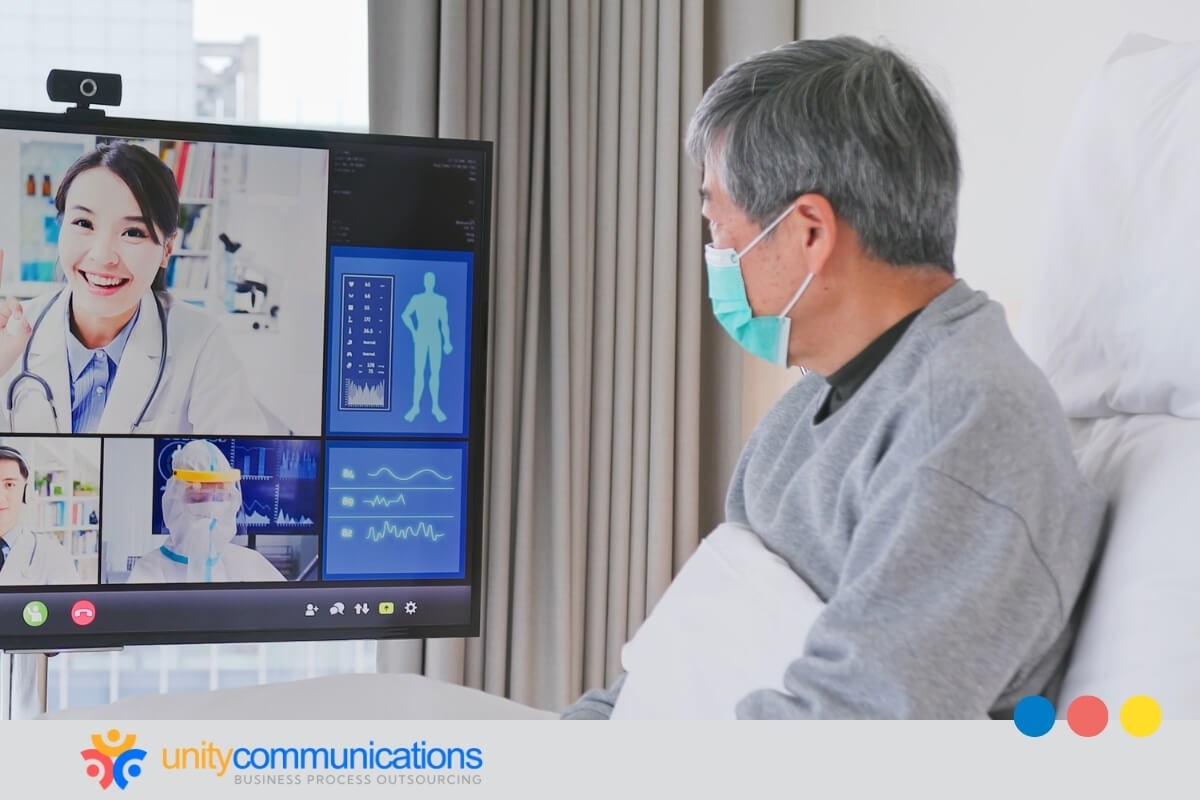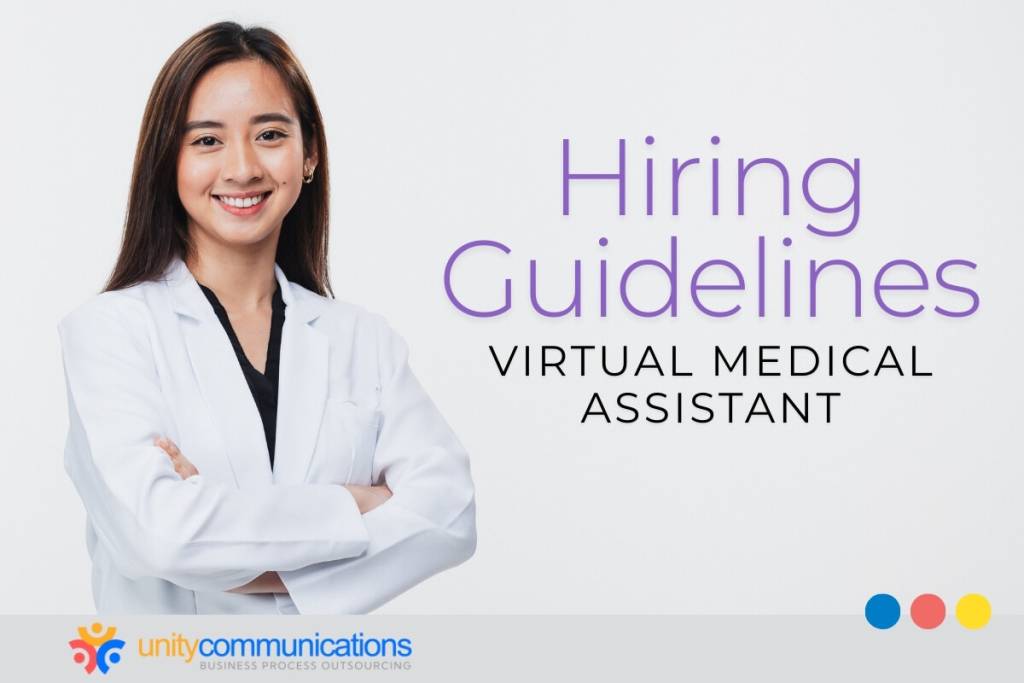Table of Contents
Effective and affordable support for administrative and clinical functions drives the increasing adoption of virtual medical assistant (VMA) services. They offer various capabilities, from scheduling and recordkeeping to patient communication.
Given VMAs’ growing role in healthcare operations, providers must be strategic and thorough in selecting remote professionals to engage in their practice. The right virtual assistant can help enhance operational efficiency and patient care quality.
This article provides concrete hiring guidelines for healthcare practices, helping identify virtual medical assistants with the necessary skills, experience, and discipline to support operations. Keep reading to learn actionable insights!
Hiring virtual medical assistants through BPO

Virtual medical assistants can be hired directly or through business process outsourcing (BPO). What is BPO? It is the practice of contracting a third party to manage specific organizational functions.
BPO in telemedicine offers significant advantages over direct hiring. BPO vendors deploy competent virtual medical assistants to streamline outsourced processes. Moreover, they cover operating expenses and offer VMA services on demand. How outsourcing works is it allows healthcare providers to save on building and maintaining a full-time in-house VMA team.
However, because virtual medical assistants play a critical role in healthcare operations, practices must collaborate with BPO partners to ensure that the external VMA team meets their high standards for skills, experience, and culture.
Read on to explore hiring guidelines for virtual medical assistants:
1. Identify specific requirements
Healthcare providers work in private clinics, hospitals, or telemedicine platforms. They have specific requirements and challenges they must address. Defining virtual medical assistants’ role when outsourcing healthcare administrative tasks is necessary for adequate support.
For example, a virtual assistant for Phoenix healthcare can manage scheduling, patient communication, and billing with clear instructions regarding responsibilities. Thus, the VMA can provide complete administrative support.
Part of the hiring guidelines for virtual medical assistants is conducting a workflow analysis to determine which areas benefit most from VMA support. It also identifies the requirements and responsibilities VMAs must fulfill.
Here are common administrative functions VMAs manage and their required competencies:
- Scheduling. Managing appointment bookings and reminders requires excellent organizational skills and the ability to efficiently coordinate multiple calendars. Practitioners need VMAs who can handle high volumes of scheduling requests, maintain accuracy, and remind patients of appointments to minimize no-shows.
- Patient communication. Answering inquiries, conducting follow-ups, and disseminating information demands strong communication skills and empathy. Healthcare providers must look for VMAs who professionally manage patient interactions, ensuring they feel heard and supported.
- Record management. Maintaining and updating electronic health records (EHR) requires proficiency in EHR systems and meticulous attention to detail. Practitioners need VMAs with a strong understanding of data entry protocols and compliance standards to maintain accurate, up-to-date, and secure patient records.
- Billing. Processing claims and managing patient billing questions requires deep knowledge of medical billing practices and experience with insurance claims. Practitioners should seek VMAs adept at navigating billing software, resolving patient inquiries, and submitting accurate claims promptly to optimize revenue cycles.
2. Assess technical proficiency
Evaluating technical skills is another critical hiring guideline, as they directly influence virtual medical assistants’ performance and effectiveness. Key competencies include familiarity with EHR systems, mastery of data entry, and technical knowledge of telehealth platforms.
Healthcare BPO services offer a global pool of proficient VMAs. Vendors can help perform the following practical assessment strategies for choosing the right virtual assistant to integrate them seamlessly into the practice and enhance operational efficiency:
- EHR systems. Testing for experience and comfort with various EHR platforms ensures the VMA can easily manage patient records and navigate the system. Candidates should be able to demonstrate proficiency and adaptability in different EHR software.
- Data entry. Evaluating speed and accuracy through a data entry task helps determine the VMA’s ability to handle large volumes of information without compromising precision. Assessing how quickly and accurately candidates can input data is essential, as this directly affects the integrity and reliability of patient records.
- Telehealth platforms. Assessing the understanding and ability to navigate telehealth tools is crucial for VMAs who will support virtual consultations and patient interactions. Candidates should be able to use telehealth platforms, assist with setup and troubleshooting of issues, and provide a seamless virtual healthcare experience.
- Technical troubleshooting. Presenting scenarios that require basic troubleshooting allows providers to gauge a VMA’s problem-solving abilities and technical know-how. Candidates should be able to quickly identify and resolve common technical issues to minimize workflow disruption.
3. Ensure compliance knowledge

The Health Insurance Portability and Accountability Act of 1996 (HIPAA) and similar privacy laws guide the healthcare industry in protecting patient information and fostering safety and trust. Virtual medical assistants managing the healthcare process in BPO must understand and adhere to these regulations to run compliant operations.
Verifying candidates’ training and certification in these areas is essential, potentially through background checks and certification reviews. By thoroughly assessing compliance capabilities, healthcare providers can feel confident that VMAs can handle sensitive information responsibly and legally.
- HIPAA Compliance. Candidates should demonstrate a thorough knowledge of HIPAA requirements and their application to everyday tasks, including handling patient data securely and confidentially.
- Training verification. Reviewing certifications related to healthcare compliance helps verify that the VMA has received formal training in relevant regulations and best practices. Check for them from reputable organizations to confirm the assistants’ credentials and expertise in maintaining regulatory standards.
- Regulatory knowledge. Awareness of state and federal healthcare regulations is crucial for compliance. Candidates should know local and national laws to avoid legal pitfalls, navigate complex legal requirements, and adhere to specific jurisdictional rules.
- Ongoing education. This process keeps the VMA informed about changes to healthcare laws and regulations. Candidates should demonstrate a proactive approach to continued education, such as attending relevant workshops or obtaining additional certifications, to stay current with compliance requirements.
4. Conduct in-depth candidate screening

Part of the hiring guidelines for virtual medical assistants is a thorough screening to assess communication skills, professionalism, and demeanor in real time. Comprehensive reference checks also help verify past job performance and reliability. Practices can select VMAs who meet their needs, fit their teams, and support their goals.
The following are best practices for interviewing and screening VMAs:
- Use video platforms to evaluate communication skills and professionalism.
- Ask situational questions to gauge problem-solving abilities and adaptability.
- Test relevant technical skills, such as EHR management and data entry.
- Assess whether the candidate aligns with the practice’s values and work culture.
- Contact previous employers to confirm job performance and reliability.
- Verify the candidate’s credentials to avoid red flags.
- Consider a probationary period to evaluate performance in a real-world setting.
The bottom line
Follow the hiring guidelines in this article and onboard virtual medical assistants that can enhance service delivery and operational efficiency. By thoroughly assessing technical proficiency, compliance knowledge, and overall fit through in-depth screening, healthcare practices can select well-equipped VMAs to support growth and improve patient care.
Let’s connect to discuss VMA support and BPO services further!




